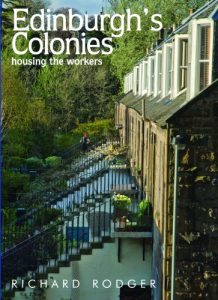Few cities can boast housing estates with the distinctiveness and charm of 'the Colonies' of Edinburgh. After a dispute in 1861 a group of building workers formed the Edinburgh Co-operative Building Company. They bought some land on the fringe of the city, contributed their own labour, and built the ‘colony’ houses at Stockbridge.
The rest is history – 150 years of continuous history. Eventually more than 2300 houses were built on 13 sites. None has been demolished; few have lain empty. The workmen knew what people wanted and could afford. Right up to the present day Colonies addresses are much sought after.
Edinburgh’s Colonies is an attractive fully illustrated colour book. It reviews the historical background to a remarkable phase in housing history. Based on extensive new research, the book provides insights into a wider social history of Edinburgh that resulted in the construction of so many ‘colonies’ scattered around the city.’
Richard Rodger is Professor of Economic and Social History at the University of Edinburgh.
His books include 'Scottish Housing in the Twentieth Century' (1989), 'European Urban History' (1993) and ‘Housing in Urban Britain 1780–1914 (1995).
The rest is history – 150 years of continuous history. Eventually more than 2300 houses were built on 13 sites. None has been demolished; few have lain empty. The workmen knew what people wanted and could afford. Right up to the present day Colonies addresses are much sought after.
Edinburgh’s Colonies is an attractive fully illustrated colour book. It reviews the historical background to a remarkable phase in housing history. Based on extensive new research, the book provides insights into a wider social history of Edinburgh that resulted in the construction of so many ‘colonies’ scattered around the city.’
Richard Rodger is Professor of Economic and Social History at the University of Edinburgh.
His books include 'Scottish Housing in the Twentieth Century' (1989), 'European Urban History' (1993) and ‘Housing in Urban Britain 1780–1914 (1995).






